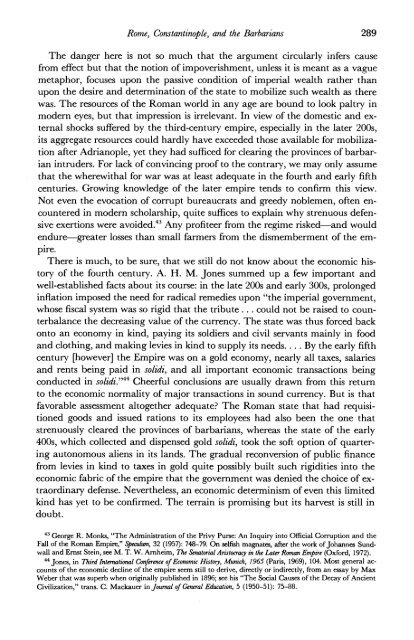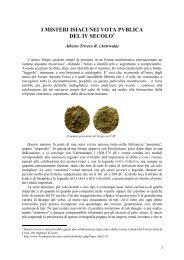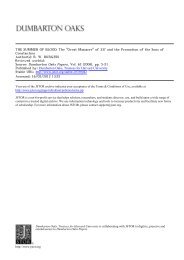Rome, Constantinople, and the Barbarians - Constantine the Great
Rome, Constantinople, and the Barbarians - Constantine the Great
Rome, Constantinople, and the Barbarians - Constantine the Great
Create successful ePaper yourself
Turn your PDF publications into a flip-book with our unique Google optimized e-Paper software.
<strong>Rome</strong>, <strong>Constantinople</strong>, <strong>and</strong> <strong>the</strong> <strong>Barbarians</strong> 289<br />
The danger here is not so much that <strong>the</strong> argument circularly infers cause<br />
from effect but that <strong>the</strong> notion of impoverishment, unless it is meant as a vague<br />
metaphor, focuses upon <strong>the</strong> passive condition of imperial wealth ra<strong>the</strong>r than<br />
upon <strong>the</strong> desire <strong>and</strong> determination of <strong>the</strong> state to mobilize such wealth as <strong>the</strong>re<br />
was. The resources of <strong>the</strong> Roman world in any age are bound to look paltry in<br />
modern eyes, but that impression is irrelevant. In view of <strong>the</strong> domestic <strong>and</strong> ex-<br />
ternal shocks suffered by <strong>the</strong> third-century empire, especially in <strong>the</strong> later 200s,<br />
its aggregate resources could hardly have exceeded those available for mobiliza-<br />
tion after Adrianople, yet <strong>the</strong>y had sufficed for clearing <strong>the</strong> provinces of barbar-<br />
ian intruders. For lack of convincing proof to <strong>the</strong> contrary, we may only assume<br />
that <strong>the</strong> wherewithal for war was at least adequate in <strong>the</strong> fourth <strong>and</strong> early fifth<br />
centuries. Growing knowledge of <strong>the</strong> later empire tends to confirm this view.<br />
Not even <strong>the</strong> evocation of corrupt bureaucrats <strong>and</strong> greedy noblemen, often en-<br />
countered in modern scholarship, quite suffices to explain why strenuous defen-<br />
sive exertions were avoided.43 Any profiteer from <strong>the</strong> regime risked-<strong>and</strong> would<br />
endure-greater losses than small farmers from <strong>the</strong> dismemberment of <strong>the</strong> em-<br />
pire.<br />
There is much, to be sure, that we still do not know about <strong>the</strong> economic his-<br />
tory of <strong>the</strong> fourth century. A. H. M. Jones summed up a few important <strong>and</strong><br />
well-established facts about its course: in <strong>the</strong> late 200s <strong>and</strong> early 300s, prolonged<br />
inflation imposed <strong>the</strong> need for radical remedies upon "<strong>the</strong> imperial government,<br />
whose fiscal system was so rigid that <strong>the</strong> tribute ... could not be raised to coun-<br />
terbalance <strong>the</strong> decreasing value of <strong>the</strong> currency. The state was thus forced back<br />
onto an economy in kind, paying its soldiers <strong>and</strong> civil servants mainly in food<br />
<strong>and</strong> clothing, <strong>and</strong> making levies in kind to supply its needs.... By <strong>the</strong> early fifth<br />
century [however] <strong>the</strong> Empire was on a gold economy, nearly all taxes, salaries<br />
<strong>and</strong> rents being paid in solidi, <strong>and</strong> all important economic transactions being<br />
conducted in solidi."44 Cheerful conclusions are usually drawn from this return<br />
to <strong>the</strong> economic normality of major transactions in sound currency. But is that<br />
favorable assessment altoge<strong>the</strong>r adequate? The Roman state that had requisi-<br />
tioned goods <strong>and</strong> issued rations to its employees had also been <strong>the</strong> one that<br />
strenuously cleared <strong>the</strong> provinces of barbarians, whereas <strong>the</strong> state of <strong>the</strong> early<br />
400s, which collected <strong>and</strong> dispensed gold solidi, took <strong>the</strong> soft option of quarter-<br />
ing autonomous aliens in its l<strong>and</strong>s. The gradual reconversion of public finance<br />
from levies in kind to taxes in gold quite possibly built such rigidities into <strong>the</strong><br />
economic fabric of <strong>the</strong> empire that <strong>the</strong> government was denied <strong>the</strong> choice of ex-<br />
traordinary defense. Never<strong>the</strong>less, an economic determinism of even this limited<br />
kind has yet to be confirmed. The terrain is promising but its harvest is still in<br />
doubt.<br />
43George R. Monks, "The Administration of <strong>the</strong> Privy Purse: An Inquiry into Official Corruption <strong>and</strong> <strong>the</strong><br />
Fall of <strong>the</strong> Roman Empire," Speculum, 32 (1957): 748-79. On selfish magnates, after <strong>the</strong> work of Johannes Sundwall<br />
<strong>and</strong> Ernst Stein, see M. T. W. Arnheim, The Senatorial Aristocracy in <strong>the</strong> Later Roman Empire (Oxford, 1972).<br />
4Jones, in Third International Confcrcnce of Economic History, Munich, 1965 (Paris, 1969), 104. Most general accounts<br />
of <strong>the</strong> economic decline of <strong>the</strong> empire seem still to derive, directly or indirectly, from an essay by Max<br />
Weber that was superb when originally published in 1896; see his "The Social Causes of <strong>the</strong> Decay of Ancient<br />
Civilization," trans. C. Mackauer in Journal of General Education, 5 (1950-51): 75-88.







